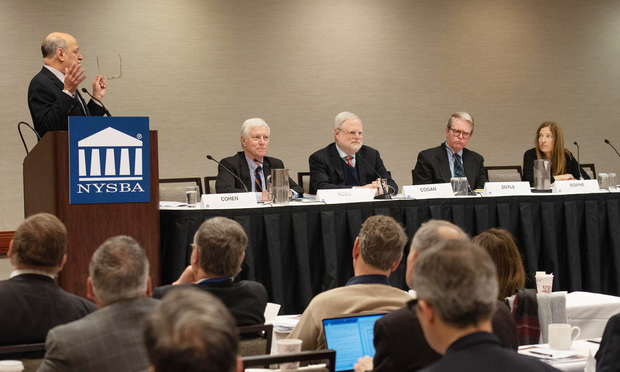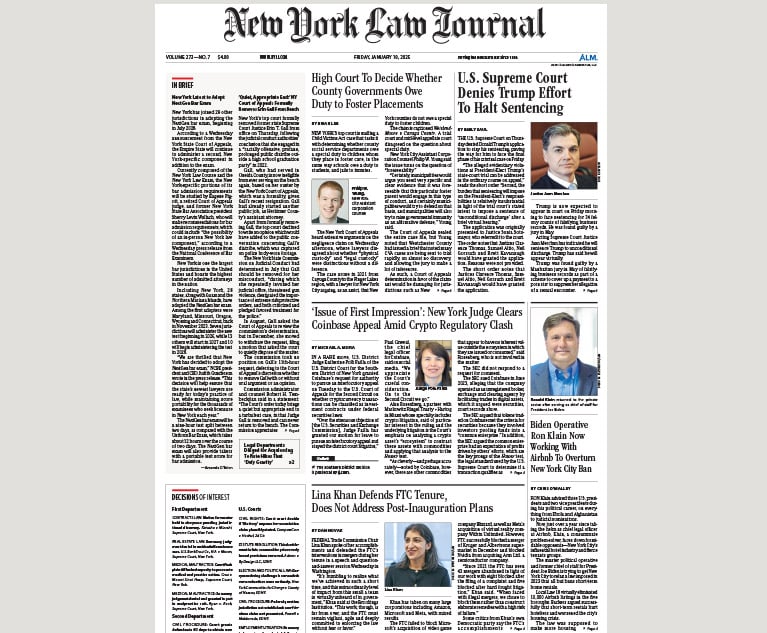Judge, Ethics Lawyers Dish on Dealing With Dishonest Clients
Ethics lawyers and U.S. District Judge Brian Cogan discussed a lawyer's duties when advising deceptive clients.
January 28, 2020 at 05:09 PM
5 minute read
 A professional discipline discussion at the New York State Bar Association annual meeting. From left are Joel Cohen, Stroock & Stroock & Lavan; Michael Ross, Law Offices of Michael S. Ross; Judge Brian Cogan, Eastern District of New York; Kevin Doyle, Grievance Committee; and Rebecca Roiphe, New York Law School. Photo: Russ DeSantis Photography and Video LLC
A professional discipline discussion at the New York State Bar Association annual meeting. From left are Joel Cohen, Stroock & Stroock & Lavan; Michael Ross, Law Offices of Michael S. Ross; Judge Brian Cogan, Eastern District of New York; Kevin Doyle, Grievance Committee; and Rebecca Roiphe, New York Law School. Photo: Russ DeSantis Photography and Video LLC
A federal judge and a panel of top ethics experts on Tuesday dove into a sensitive area in the law: dishonest clients and when attorneys are obliged to correct them or investigate the possibility that they're being misled.
U.S. District Judge Brian Cogan, while acknowledging that the issue was merely hypothetical during his time in the private sector, said he's often confronted with cases where a lawyer doesn't appear to have dug deep enough into his client's version of the facts, especially in civil lawsuits. Cogan, sitting in the Eastern District of New York, said lawyers should be wary if their client starts asking "hypotheticals" about what evidence would support their case.
"Clients aren't lawyers, and they often think 'going to the mat' means going in and doing whatever is necessary to [back up] their story," the judge said. "If you've got a client who's loose …you've really got to have that talk."
Other members of the panel at the New York State Bar Association's annual meeting Tuesday, titled "When the Lawyer Is Obliged to Turn Against His Client," included Michael Ross, a prominent legal ethics attorney who runs his own firm, and Kevin Doyle, counsel for the attorney grievance committee for the Appellate Division, First Department.
Some of the panelists said one way to avoid the risk that a client would change his or her version of the facts as a case advanced was by seeking evidence from other sources first and focusing initial discussions on something other than a detailed version of the facts.
"I think people bring fear, ego, money and a lot of other things to the table," Ross said. "The very last place I go to find the facts are the clients."
"With due respect, that sounds like an effort at self-protection," said moderator Joel Cohen, a white-collar defense lawyer who is senior counsel at Stroock & Stroock & Lavan.
"I do not want to be burdened with a client telling me a preposterous story in our first meeting," Ross explained.
A recurring topic during the panel discussion was when a lawyer must notify a tribunal, or the other side, of a client's falsehood. The New York Rules of Professional Conduct define "knowing" something to be false as having "actual knowledge," which the rules say can be inferred from the circumstances. The panelists discussed several hypotheticals where a lawyer deliberately did not press a client who seemed to be laying the groundwork to lie or produce false evidence.
"The Rules themselves, as written, do not include willful blindness. … But in real life, I wouldn't risk it," said Rebecca Roiphe, a law professor at New York Law School.
The discussion of "actual knowledge" turned to the case of U.S. v. Parse, a 2015 decision by the U.S. Court of Appeals for the Second Circuit to order a new trial for Deutsche Bank broker David Parse despite his lawyers having arguably realized that one of the jurors—a suspended lawyer with a criminal record—had lied about her identity.
In that case, lawyers for Parse investigated the background of juror Catherine Conrad and found that she was not the stay-at-home housewife she presented herself to be. U.S. District Judge William Pauley of the Southern District of New York rejected Parse's bid for a new trial, saying his lawyers showed "a glaring lack of reasonable diligence" when confronted with questions about Conrad's identity and made the strategic gambit not to object to her presence on the jury.
The Second Circuit reversed that decision, though. Even though one of Parse's lawyers wrote "Jesus, I do think that it's her" in an email toward the start of deliberations, the appellate court said in its context, that line "exhibited something short of actual knowledge." The Second Circuit's logic was criticized by Roiphe, Doyle and Cogan.
"There's a reason we refer to our brothers on the Court of Appeals as the Court of Intermediate Error," Cogan said. "Don't follow Parse."
The panelists also discussed the best way for a lawyer to correct a client's misstatement, which is required under Rule 3.3 of the New York State Rules of Professional Conduct. Ross said he might have a "bathroom conversation" with his client during a break in a deposition where he tells them, in no uncertain terms, that the client's testimony had contradicted what they'd told Ross: "You can go back there and correct it yourself, or I can correct it," he said.
One member of the audience asked whether it was possible for a client to certify that his or her discovery obligations had been fulfilled, rather than for the attorney to do so. If that were the case, Ross and other panelists noted, it could raise red flags.
"It's only a matter of time until your client is cornered, and people say, 'what did [the attorney] know and when did he know it?'" Ross said.
This content has been archived. It is available through our partners, LexisNexis® and Bloomberg Law.
To view this content, please continue to their sites.
Not a Lexis Subscriber?
Subscribe Now
Not a Bloomberg Law Subscriber?
Subscribe Now
NOT FOR REPRINT
© 2025 ALM Global, LLC, All Rights Reserved. Request academic re-use from www.copyright.com. All other uses, submit a request to [email protected]. For more information visit Asset & Logo Licensing.
You Might Like
View All

Sullivan & Cromwell Signals 5-Day RTO Expectation as Law Firms Remain Split on Optimal Attendance
Trending Stories
- 1'It's Not Going to Be Pretty': PayPal, Capital One Face Novel Class Actions Over 'Poaching' Commissions Owed Influencers
- 211th Circuit Rejects Trump's Emergency Request as DOJ Prepares to Release Special Counsel's Final Report
- 3Supreme Court Takes Up Challenge to ACA Task Force
- 4'Tragedy of Unspeakable Proportions:' Could Edison, DWP, Face Lawsuits Over LA Wildfires?
- 5Meta Pulls Plug on DEI Programs
Who Got The Work
Michael G. Bongiorno, Andrew Scott Dulberg and Elizabeth E. Driscoll from Wilmer Cutler Pickering Hale and Dorr have stepped in to represent Symbotic Inc., an A.I.-enabled technology platform that focuses on increasing supply chain efficiency, and other defendants in a pending shareholder derivative lawsuit. The case, filed Oct. 2 in Massachusetts District Court by the Brown Law Firm on behalf of Stephen Austen, accuses certain officers and directors of misleading investors in regard to Symbotic's potential for margin growth by failing to disclose that the company was not equipped to timely deploy its systems or manage expenses through project delays. The case, assigned to U.S. District Judge Nathaniel M. Gorton, is 1:24-cv-12522, Austen v. Cohen et al.
Who Got The Work
Edmund Polubinski and Marie Killmond of Davis Polk & Wardwell have entered appearances for data platform software development company MongoDB and other defendants in a pending shareholder derivative lawsuit. The action, filed Oct. 7 in New York Southern District Court by the Brown Law Firm, accuses the company's directors and/or officers of falsely expressing confidence in the company’s restructuring of its sales incentive plan and downplaying the severity of decreases in its upfront commitments. The case is 1:24-cv-07594, Roy v. Ittycheria et al.
Who Got The Work
Amy O. Bruchs and Kurt F. Ellison of Michael Best & Friedrich have entered appearances for Epic Systems Corp. in a pending employment discrimination lawsuit. The suit was filed Sept. 7 in Wisconsin Western District Court by Levine Eisberner LLC and Siri & Glimstad on behalf of a project manager who claims that he was wrongfully terminated after applying for a religious exemption to the defendant's COVID-19 vaccine mandate. The case, assigned to U.S. Magistrate Judge Anita Marie Boor, is 3:24-cv-00630, Secker, Nathan v. Epic Systems Corporation.
Who Got The Work
David X. Sullivan, Thomas J. Finn and Gregory A. Hall from McCarter & English have entered appearances for Sunrun Installation Services in a pending civil rights lawsuit. The complaint was filed Sept. 4 in Connecticut District Court by attorney Robert M. Berke on behalf of former employee George Edward Steins, who was arrested and charged with employing an unregistered home improvement salesperson. The complaint alleges that had Sunrun informed the Connecticut Department of Consumer Protection that the plaintiff's employment had ended in 2017 and that he no longer held Sunrun's home improvement contractor license, he would not have been hit with charges, which were dismissed in May 2024. The case, assigned to U.S. District Judge Jeffrey A. Meyer, is 3:24-cv-01423, Steins v. Sunrun, Inc. et al.
Who Got The Work
Greenberg Traurig shareholder Joshua L. Raskin has entered an appearance for boohoo.com UK Ltd. in a pending patent infringement lawsuit. The suit, filed Sept. 3 in Texas Eastern District Court by Rozier Hardt McDonough on behalf of Alto Dynamics, asserts five patents related to an online shopping platform. The case, assigned to U.S. District Judge Rodney Gilstrap, is 2:24-cv-00719, Alto Dynamics, LLC v. boohoo.com UK Limited.
Featured Firms
Law Offices of Gary Martin Hays & Associates, P.C.
(470) 294-1674
Law Offices of Mark E. Salomone
(857) 444-6468
Smith & Hassler
(713) 739-1250








